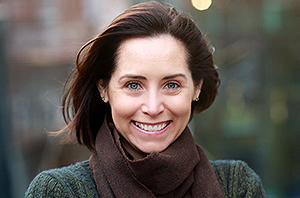Samantha Brugmann, PhD ’05, had one simple Christmas wish when she was 11 years old: a microscope. Back then, she had no way of knowing the gift would lead to a handshake with President Barack Obama as she accepted the government’s highest honor for those in her field: the Presidential Early Career Awards for Scientists and Engineers.
On that day in 2016, Brugmann says, the awardees were told to take deep breaths and not to lock their knees because people sometimes pass out when President Obama walks into the room. Everyone chuckled, thinking it was a joke.

Then he came into view. “There was a collective gasp,” Brugmann recalls with a laugh. Receiving the award, she adds, was a great motivator. “Somebody’s put their faith in you to say ‘we hope that you take this and move your respective field of science forward,’ ” says Brugmann, associate professor in the Department of Surgery’s Division of Plastic Surgery and Department of Pediatrics’ Division of Developmental Biology within the Cincinnati Children’s Hospital Medical Center. Brugmann’s lab focuses on craniofacial abnormalities and the mechanisms behind craniofacial development. “When you consider the different diseases that can impact children, there are some you can cover up … but with a craniofacial anomaly, it’s something you can’t really hide. It’s something people use to judge you very quickly,” she says. Brugmann focuses on a few specialties within the field, including the development of neural crest cells, a multipotent cell population that gives rise to a majority of the structures in the head, as well as the study of primary cilium. Cilia, which are cellular organelles, extend off the surface of almost every cell in the body and help in the transduction of different signaling pathways, Brugmann notes. Diseases that are caused by a lack of primary cilia are called ciliopathies. “There are quite a few ciliopathies that have pretty significant facial phenotypes,” Brugmann explains, “so there is the ciliopathy avenue and the neural crest avenue, and we’re looking at the marriage between them. We’re trying to find out how neural crest cells are affected in ciliopathies.” She is also seeking to better understand ciliopathies and the molecular basis for them, and with that knowledge, possibly characterize some diseases that have not yet been classified as ciliopathies. Brugmann’s research interests were formed while she was a student in the genetics program at the George Washington University (GW) Institute for Biomedical Sciences. She worked in the lab of Sally Moody, PhD, chair of the Department of Anatomy and Regenerative Biology and professor of anatomy and regenerative biology at the GW School of Medicine and Health Sciences. Brugmann says her relationship with Moody is one of the most important in her career. “She really led by example,” says Brugmann. “She’d be in the lab doing experiments, she’d be processing the embryos herself. She’s someone who’s very passionate about science, and after having a lab for many years, [she is] somebody who still will get in there and do the work.” The two communicate regularly, and Brugmann turns to Moody when she needs professional guidance. “It’s important to be supportive of your students, and I frequently think about how Sally was with not only me, but also with the others in the lab,” says Brugmann. “If I am struggling or wondering how to mentor someone, there are times I’ve called her up or sent her an email. She’s the standard that I try to emulate.”



